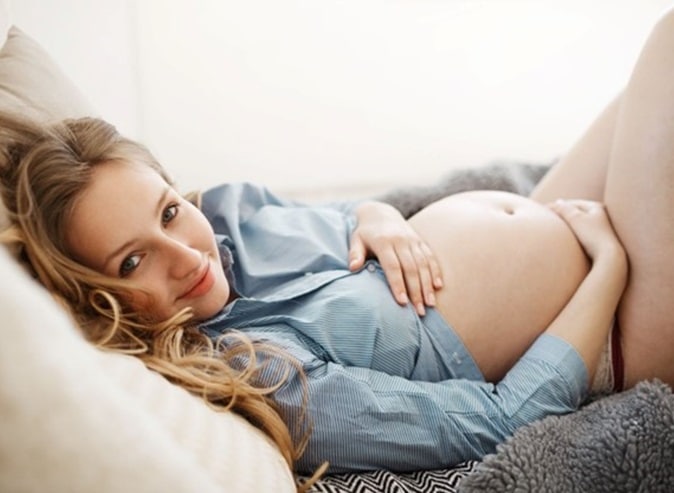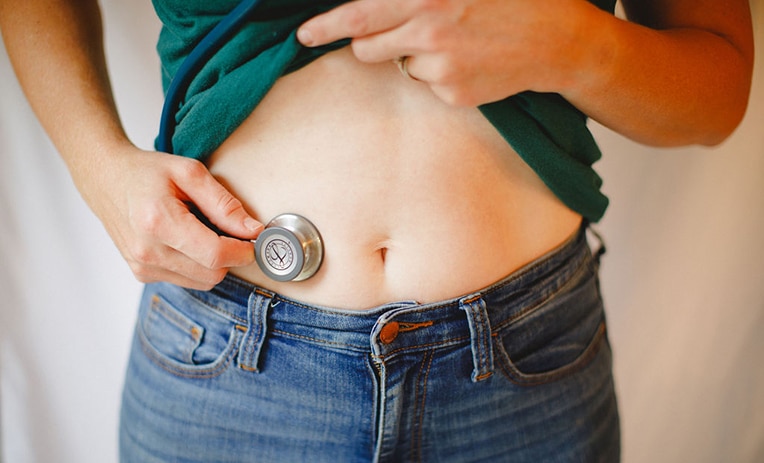Fertility challenges can be a deeply personal struggle for any woman trying to conceive. But the struggle intensifies if you have both weight and fertility challenges.

Weight is an often overlooked factor influencing fertility. In this article, we’ll discuss the connection between weight and fertility, and how weight loss may be able to improve your chances of getting pregnant.
How Excess Weight Can Affect Fertility
Both infertility and excess weight (i.e., overweight or obesity) are expanding health problems of the modern era. The Centers for Disease Control and Prevention (CDC) estimates that 1 in 7 (13.4%) women in the United States have difficulty getting pregnant.1 And more than 2 in 3 American women are affected by overweight or obesity.2
Decades of research have demonstrated the negative impact of excess weight on reproductive function. Primary infertility outcomes linked to overweight and obesity include:3
- Irregular or absent ovulation (known as anovulation)
- Impaired endometrial decidualization, the process required to prepare the endometrium for pregnancy
- Decreased pregnancy rates (approximately 4% to 5%)4
- Delayed time to pregnancy5
- Reproductive hormone imbalances
Women affected by obesity are also more likely to experience:6
- Poorer in vitro fertilization (IVF) outcomes
- Increased risk of miscarriage
- Higher doses of medications used to induce ovulation
The exact mechanism by which weight affects fertility remains unclear. And not everyone with unexplained infertility will improve their chances of getting pregnant by losing weight. This is why I highly recommend working with a women’s hormone expert to identify the root cause(s) of your infertility.
7 Ways Weight Loss Can Affect Your Chances of Getting Pregnant
Before we begin, I want to emphasize one point—just telling a woman to “lose weight” is a gross oversimplification. Yes, it may help ease some symptoms of hormonal imbalances, but we need to look at various factors beyond weight to optimize your chances of getting pregnant.
1. Restore Hormonal Balance
A common cause of infertility among women is polycystic ovarian syndrome, or PCOS, an endocrine disorder related to an imbalance of reproductive hormones.
In addition to infertility, symptoms of PCOS can include:7
- Menstrual irregularities
- Increased hair growth on your face, chest, belly, or upper thighs
- Insulin resistance
- Acne
- Thinning hair
PCOS also has a vicious cyclical relationship with obesity. Women with obesity are more likely to develop PCOS, and those with PCOS are at greater risk of becoming obese.8
Weight loss may help restore hormonal balance for women with PCOS. One study showed that even modest weight loss (just 5% of one’s body weight) could lead to significant improvements in symptoms and restoration of ovulation.9 Furthermore, a 2023 publication reported that weight loss in women with PCOS and overweight/obesity could also improve maternal health and pregnancy outcomes.10
2. Lower Insulin Resistance
Insulin resistance is a prominent feature of PCOS, affecting between 35% and 80% of women with the disorder.11 That’s because high levels of insulin also increase levels of androgens, which are primarily known as male sex hormones. Excess androgens are converted into estrogen, which in turn stimulates the secretion of luteinizing hormone. The over-secretion of luteinizing hormone results in the absence of ovulation.
Research also shows that insulin resistance can lead to smaller eggs or delayed production of eggs, which can contribute to infertility issues.12
The good news is that insulin resistance is reversible. An increasing amount of evidence suggests that weight-loss interventions, using caloric restriction and/or exercise, can cause marked improvements in insulin sensitivity.13 Even losing just 10% of your total body weight can improve your insulin resistance.14
I encourage you to take an active approach to your diet and stick with it long-term. Fasting and getting the right macros can help expedite results.
3. Stay Active
The contributions of diet, smoking, and alcohol consumption to fertility are clear. Interestingly, the role of exercise in fertility remains less clear.
Researchers have found that regular moderate-to-vigorous exercise may improve health outcomes for both the mother and the fetus. 15 Exercise can also elevate your mood, and this effect has been shown to be particularly beneficial for women struggling with infertility.16
However, frequent vigorous exercise could negatively affect fertility in healthy women.17,18 If you’re healthy and wish to continue your vigorous exercise regimen while attempting to conceive, researchers recommend increasing your caloric intake by the number of calories burned during your exercise session.19
For women affected by PCOS, vigorous aerobic exercise and resistance training appear to be most beneficial for reproductive health.20 Even if you don’t see measurable changes in your body, try to adhere to your exercise regimen long-term.
I recommend focusing on building lean muscle mass and getting at least 500 minutes of activity each week.
4. Improve Your Gut Health
Your gut microbiota produce various substances that can affect your body, such as:21,22
- Short-chain fatty acids
- Vitamins
- Antioxidants
- Certain neurotransmitters
- Bile acids
- Various toxins
When these products enter the bloodstream, they can affect immune and metabolic processes. This means that an unbalanced gut microbiome (called dysbiosis) can contribute to metabolic disorders, including obesity.23
Some research studies found that gut microbiome composition can help predict how readily an individual loses weight in response to weight loss interventions.24
In short, a healthy, diverse gut microbiome can influence weight loss. While science is continually evolving in this area, there are many strategies you can implement to improve the health and diversity of your gut microbiome. For example, we know that simple lifestyle changes that are often overlooked – such as getting enough sleep and managing stress – support a healthy gut microbiome.
5. Prioritize High-Quality Sleep
The importance of quality sleep is being increasingly recognized as a determinant of women’s reproductive health. Chronic lack of sleep can lead to the production of more stress hormones, which reduce levels of estrogen, testosterone, and other reproductive hormones.25
Poor sleep quality can also have negative effects on your metabolism (which can lead to weight gain), immune system, and cardiovascular system, all of which can impact reproduction.26
One sleep intervention study found that women who reported higher sleep quality were more likely to be successful at weight loss.27
In general, I recommend:
- Getting 7 to 9 hours of sleep every night
- Unplugging electronics at least an hour before going to bed
- Trying to sleep at the same time each night
For more of my top sleep tips, check out my blog post here.
6. Avoid Toxins
Toxins are everywhere – in our water, food, environment, skincare items, toys, and so much more.
And they could be causing you to gain weight.
Toxins promote weight gain in various ways, a few of which include:
- Damaging your thyroid gland, which governs your metabolic rate28
- Inhibiting leptin signals to your brain, which can lead to overeating29
- Interfering with estrogen functions30
- Disrupting metabolic processes, which may lead to insulin resistance31
- Promoting the growth of fat cells32
The accumulation of toxins in your body creates a vicious cycle. The more toxins you have, the greater risk you have for overweight and obesity. And the more overweight you are, the greater potential risk you have for toxicity.
It’s extremely difficult, if not impossible, to avoid all toxins. Weight loss helps, but rapid weight loss could be damaging to your health. Fat tissue acts as a reservoir for many types of toxins, so rapid fat loss can release stored toxins into the bloodstream. This exposes your vital organs, such as your brain, lungs, and others, to the toxins now circulating in your bloodstream.33
A women’s hormone expert can help you create a comprehensive plan to detoxify your body using natural methods to avoid adding more to your toxic load.
7. Reduce Stress
For many women, infertility can be a silent struggle. You may be feeling depressed, anxious, stressed out, guilty, isolated, and even ashamed.
And as many of us already know, chronic stress can push us to desire high-fat, sweet “comfort foods.” In response to stress, your adrenal glands release cortisol, which increases your appetite and your motivation to eat. Normally, cortisol returns to normal levels when the stress goes away. But if you’re constantly stressed, your cortisol levels may stay high and continue to wreak havoc on your diet.
Try to incorporate stress management techniques, such as meditation or deep breathing, into your daily life. You can also check out my blog on Top Foods and Herbs to Support Menstrual Hormone Balance and Calm Your Nervous System.
Optimize Your Fertility With a Women’s Hormone Specialist in Boston
Optimizing your chances of getting pregnant requires a personalized strategy and consistency.
If you have weight or fertility concerns, you have options. As a naturopathic physician specializing in women’s hormonal health, I’ve worked with hundreds of women to help them lose weight and get pregnant using natural methods.
Schedule a free 15-minute consultation to learn more about how I can help you.
References:
- https://www.cdc.gov/nchs/fastats/infertility.htm
- https://www.cdc.gov/nchs/hus/data-finder.htm?year=2017&table=Table%20058
- https://pmc.ncbi.nlm.nih.gov/articles/PMC10856238/
- https://pubmed.ncbi.nlm.nih.gov/18077317/
- https://pmc.ncbi.nlm.nih.gov/articles/PMC2794667/
- https://pmc.ncbi.nlm.nih.gov/articles/PMC10856238/
- https://my.clevelandclinic.org/health/diseases/8316-polycystic-ovary-syndrome-pcos#symptoms-and-causes
- https://pmc.ncbi.nlm.nih.gov/articles/PMC6734597/
- https://pmc.ncbi.nlm.nih.gov/articles/PMC6734597/
- https://academic.oup.com/humrep/article/38/3/471/6986989
- https://pmc.ncbi.nlm.nih.gov/articles/PMC8984569/
- https://pmc.ncbi.nlm.nih.gov/articles/PMC9665922/
- https://pmc.ncbi.nlm.nih.gov/articles/PMC5519190/
- https://onlinelibrary.wiley.com/doi/10.1002/oby.23618
- https://pubmed.ncbi.nlm.nih.gov/30337460/
- https://pmc.ncbi.nlm.nih.gov/articles/PMC8063288/
- https://pmc.ncbi.nlm.nih.gov/articles/PMC3340509/
- https://pubmed.ncbi.nlm.nih.gov/19801570/
- https://pmc.ncbi.nlm.nih.gov/articles/PMC4281686/
- https://pmc.ncbi.nlm.nih.gov/articles/PMC10310950/
- https://pmc.ncbi.nlm.nih.gov/articles/PMC9286904/
- https://pmc.ncbi.nlm.nih.gov/articles/PMC8291023/
- https://pmc.ncbi.nlm.nih.gov/articles/PMC8291023/
- https://www.nature.com/articles/s41366-018-0093-2
- https://carolinasfertilityinstitute.com/can-lack-sleep-affect-fertility/
- https://pmc.ncbi.nlm.nih.gov/articles/PMC10617707/
- https://pmc.ncbi.nlm.nih.gov/articles/PMC4861065/
- https://pmc.ncbi.nlm.nih.gov/articles/PMC2935336/
- https://pubmed.ncbi.nlm.nih.gov/21801469/
- https://pmc.ncbi.nlm.nih.gov/articles/PMC6501744/
- https://pmc.ncbi.nlm.nih.gov/articles/PMC10656111/
- https://pmc.ncbi.nlm.nih.gov/articles/PMC5359373/
- https://www.sciencedirect.com/science/article/pii/S0022316624000373




